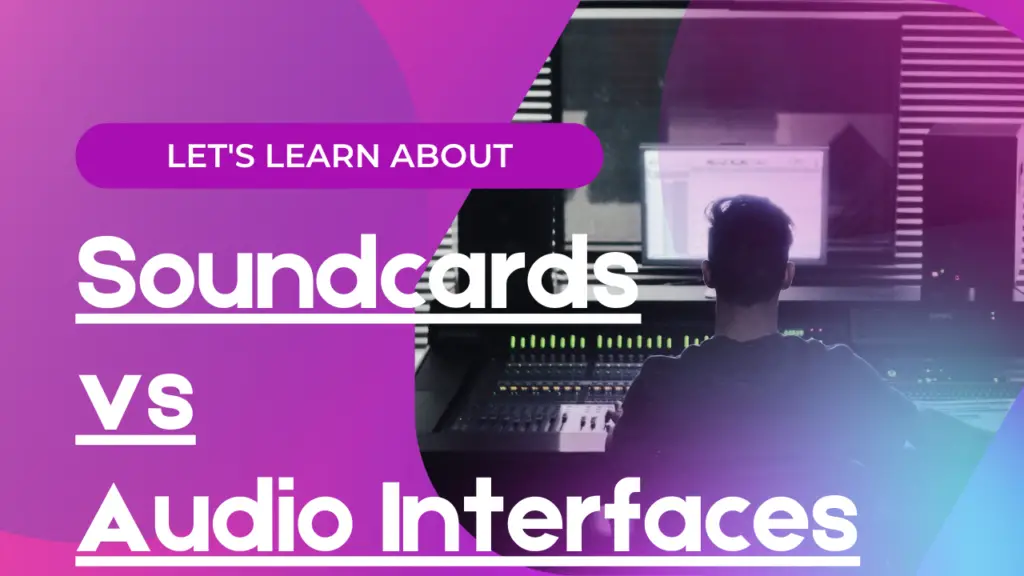SOUND CARD VS AUDIO INTERFACE
When starting out with recording from home it is important to understand the difference between a soundcard and an audio interface. There are many reasons that we will outline in this article.

Why do I need an Audio Interface?
The number one enemy in any home recording enthusiast’s setup is latency. Latency is the time that it takes for your played sounds to reach the computer. If this is laggy then you will have trouble playing to backing tracks and your recordings will be out of time. There are 2 key types of latency – hardware and software.
Hardware latency is the time it takes your soundcard to process a played sound and send it on to its destination (in this case, your computer) and back again (when recording). This may include the time taken for an electric guitar’s signal. This is why you can hear yourself playing with no delay through your headphones when recording, but the sound of the backing track does not sync up to what you are hearing.
Software latency is created by the computer’s ability to process sounds in real time. If this is too slow then it will affect how quickly you can play or record – sounds will
if you have a very basic set up, such as a guitar and a microphone to record vocals, then you may get away without having an audio interface just using the sound card that comes with the computer. but if you are looking for something more advanced then it can be worth investing in an audio interface.
Sound Cards vs Audio Interfaces
There are 2 key types of latency that you will come across when recording, hardware and software. Hardware latency is the time it takes for your sound card to process a played sound and send it on to its destination (in this case, your computer) and back again (when recording).
Audio Interface advantages
• Reduced Latency
• A Range of Features such as Native DSP with separate I/O per input, MIDI and Automation
• You can connect microphones for vocals or instruments to your computer using XLR cables
Audio Interface Disadvantages
- More cables, power outlets, and time on the front end needed to get it all set up
- It can over complicate your home set-up if you are new to recording
- Audio interfaces can be expensive (but worth it!)
Tips to help you decide if you should buy one or not
The Sound card vs audio interface debate is actually not much of a debate at all- you legitimately need one in order to record your music properly without lag.
Yes, you can try and use the Asio4All drivers that many people try to use, but you will only really start to record great music once you invest in an audio interface.
So with that out of the way, let’s look at some deciding factors that you need to have in mind when deciding on buying an audio interface.
Budget: How much money do you want to spend?
Instrument Count: Will you be using a single guitar, or are you recording multiple tracks at once, like a drumkit?
Genre: What style of music will you be recording? If you plan on using a lot of distortion then your pre-amps don’t have to be high quality and expensive ones that you would need for clean vocals and sound.
Return on investment: What are you hoping to get out of your recording? If you plan on spending a lot of money on this then make sure that you are dedicated to recording your music. Many people buy an audio interface in a fit of inspiration and then they neglect it.
Things to look out for when purchasing an audio interface
When you look at buying an audio interface you really want to think about what you need. For example, if you are just starting out you may want to buy a small audio interface that is easy to set up but has no frills so that it is cheap. If money isn’t an issue then think about the features that you will use and what your requirements will be in the future.
Here are some of the Features that you should consider:
- Compatibility with other devices: what are you planning on recording- bass, guitar, vocals, electronic music?
- Interface connector count: How many instruments will you be using with this interface?
- Portability: Will you be taking this with you to record your practice sessions and gigs, or will it stay in your home studio?
- Build quality: If you are moving it around then it needs to be strong and built with quality materials
- Price: You don’t want to regret your purchase, so find an interface to suit your budget.
Conclusion
We hope that you have learned something new about Audio Interfaces and how they can help you in your music career. We want to stress again the importance of budgeting when purchasing an audio interface. Make sure that you are dedicated to recording, because if not then it will be wasted money!
If this is too out of your price range then think about what you really need right now. If recording is something that you are doing as a hobby then maybe an entry level interface will do the trick to get you started, but if this is something that you want to seriously pursue then think about spending the extra money on a more expensive model!
So what audio interface should I buy?
The PreSonus Audiobox is a great entry level interface for those who are just starting out, and we have already covered the Scarlett 2i2 which you can read about here.

